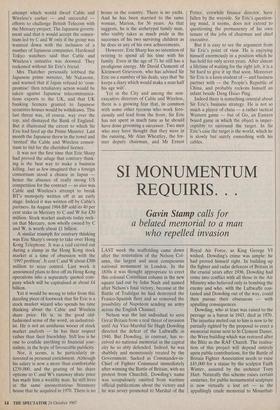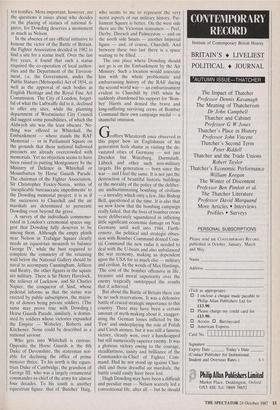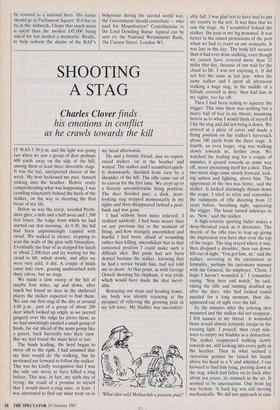SI MONUMENTUM REQUIRIS. . .
Gavin Stamp calls for
a belated memorial to a man who repelled invasion
LAST week the scaffolding came down after the restoration of the Nelson Col- umn, the largest and most conspicuous national monument in London. In the 1830s it was thought appropriate to erect this colossal Corinthian column in the new square laid out by John Nash and named after Nelson's final victory, because at the Battle of Trafalgar he had destroyed the Franco-Spanish fleet and so removed the possibility of Napoleon sending an army across the English Channel.
Nelson was the last individual to save Great Britain from a real threat of invasion until Air Vice-Marshal Sir Hugh Dowding directed the defeat of the Luftwaffe in 1940. But Dowding, in contrast, has re- ceived no national memorial in the capital city he so ably defended. Indeed, he was shabbily and monstrously treated by the Government. Sacked as Commander-in- Chief of Fighter Command immediately after winning the Battle of Britain, with no protest from Churchill, Dowding's name was scrupulously omitted from wartime official publications about the victory and he was never promoted to Marshal of the Royal Air Force, as King George VI wished. Dowding's crime was simple: he had proved himself right. In building up the fighter and radar defences of Britain in the crucial years after 1936, Dowding had come into conflict with all those in the Air Ministry who believed only in bombing the enemy and who, with the Luftwaffe con- tained and Dowding out of the way, could then pursue their obsessions — with appalling consequences.
Dowding, who at least was raised to the peerage as a baron in 1943, died in 1970. The injustice meted out to him is now to be partially righted by the proposal to erect a memorial statue next to St Clement Danes, the Wren building which was restored after the Blitz as the RAF Church. The realisa- tion of this project will depend entirely upon public contributions, for the Battle of Britain Fighter Association needs to raise £45,000 for a statue by the sculptor Faith Winter, assisted by the architect Tony Hart. Naturally this scheme raises certain anxieties, for public monumental sculpture is now virtually a lost art — as the appallingly crude memorial to Mountbat- ten testifies. More important, however, are the questions it raises about who decides on the placing of statues of national fi- gures, for Dowding deserves a monument as much as Nelson.
In the absence of any official initiative to honour the victor of the Battle of Britain, the Fighter Association decided in 1982 to find a site for a statue itself. Over the last five years, it found that such a statue required the co-operation of local author- ities and the Department of the Environ- ment, i.e. the Government, under the Public Statues (Metropolis) Act of 1854, as well as the approval of such bodies as English Heritage and, the Royal Fine Art Commission. The City of London, forget- ful of what the Luftwaffe did to it, declined to offer any sites, while the planning departmeht of Westminster City Council did suggest some possibilities, of which the Aldwych site was the least obscure. No- thing was offered in Whitehall, the Embankment — where stands the RAF Memorial — or in Parliament Square on the grounds that these national hallowed precincts are already overcrowded with memorials. Yet no objection seems to have been raised to putting Montgomery by the Ministry of Defence in Whitehall or Mountbatten by Horse Guards Parade. The chairman of the Fighter Association, Sir Christopher Foxley-Norris, writes of 'inexplicable bureaucratic impediments' to the Dowding memorial project; it is as if the successors to Churchill and the air marshals are determined to persecute Dowding even beyond the grave.
A survey of the individuals commemo- rated in London's ceremonial spaces sug- gest that Dowding fully deserves to be among them. Although the empty plinth near Nelson in Trafalgar Square clearly needs an equestrian monarch to balance George IV, while the bust required to complete the symmetry of the retaining wall below the National Gallery should be naval to accompany Cunningham, Jellicoe and Beatty, the other figures in the square are military. There is Sir Henry Havelock, the reliever of Lucknow, and Sir Charles Napier, the conqueror of Sind, whose pedestal informs us that the statue was erected by public subscription, the major- ity of donors being private soldiers. (The same may prove true with Dowding.) Horse Guards Parade, similarly, is domin- ated by soldiers whose victories expanded the Empire — Wolseley, Roberts and Kitchener. None could be described as a national saviour.
Who gets into Whitehall is curious. Opposite the Horse Guards is the 8th Duke of Devonshire, the statesman not- able for declining the office of prime minister thrice. To his north is the eques- trian Duke of Cambridge, the grandson of George III, who was a largely ornamental commander-in-chief of the army for almost four decades. To his south is another equestrian figure: that of 'Butcher' Haig, who seems to me to represent the very worst aspects of our military history. Par- liament Square is better. On the west side there are the Victorian statesmen — Peel, Derby, Disraeli and Palmerston — and on the north side Smuts — another Imperial figure — and, of course, Churchill. And between these two last there is a space waiting to be filled. . . .
The one place where Dowding should not go is on the Embankment by the Air Ministry. Such a location would associate him with the whole problematic and embarrassing history of the RAF during the second world war — an embarrassment evident to Churchill by 1945 when he suddenly abandoned his support for 'Bom- ber' Harris and denied the brave and long-suffering surviving crews of Bomber Command their own campaign medal — a shameful omission.
Gobserved Geoffrey Wheatcroft once obseed in this paper how an Englishman of his generation feels shame in visiting the de- vastated cities of Germany — not just Dresden but Wiirzburg, Darmstadt, Liibeck and other such non-military targets. His generation — born since the war — and I feel the same. It is not just the destruction of beautiful historic buildings or the morality of the policy of the deliber- ate undiscriminating bombing of civilians — a morality which only a few, like Bishop Bell, questioned at the time. It is also that we now know that the bombing campaign really failed, that the lives of bomber crews were deliberately squandered in inflicting little significant economic damage on Nazi Germany until well into 1944. Furth- ermore, the political and strategic obses- sion with Bomber Command denied Coas- tal Command the new radar it needed to deal with the U-boats and also unbalanced the war economy, making us dependent upon the USA for so much else — military and civilian. In the words of Max Hastings, 'The cost of the bomber offensive in life, treasure and moral superiority over the enemy tragically outstripped the results that it achieved.'
But about the Battle of Britain there can be no such reservations. It was a defensive battle of crucial strategic importance to this country. There may have been a certain amount of myth-making about it, exagger- ating the German losses inflicted by the 'Few' and underplaying the role of Polish and Czech airmen, but it was still a famous victory, cleanly won, over a handicapped but still numerically superior enemy. It was a glorious victory owing to the courage, steadfastness, sanity and brilliance of the Commander-in-Chief of Fighter Com- mand. Had he not stood up against Chur- chill and those dreadful air marshals, the battle could easily have been lost.
Hugh Dowding may have been a difficult and peculiar man — Nelson scarcely led a conventional life, after all — but he should be revered as a national hero. His statue should go in Parliament Square. If it has to be in the Aldwych, I hope that much more is spent than the modest £45,000 being asked for too modest a memorial. Really, to help redeem the shame of the RAF's behaviour during the second world war, the Government should contribute — who paid for Mountbatten? Contributions to the Lord Dowding Statue Appeal can be sent do the National Westminster Bank, 18a Curzon Street, London Wl.




















































 Previous page
Previous page